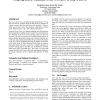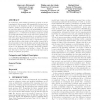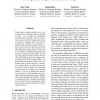171 search results - page 7 / 35 » Logical omniscience and common knowledge: WHAT do we know an... |
IUI
2003
ACM
14 years 24 days ago
2003
ACM
How do we know if we can afford a particular purchase? We can find out what the payments might be and check our balances on various accounts, but does this answer the question? Wh...
KR
2010
Springer
14 years 10 days ago
2010
Springer
This is a case-study in knowledge representation. We analyze the ‘one hundred prisoners and a lightbulb’ puzzle. In this puzzle it is relevant what the agents (prisoners) know...
ATAL
2011
Springer
12 years 7 months ago
2011
Springer
In modal logic, when adding a syntactic property to an axiomatisation, this property will semantically become true in all models, in all situations, under all circumstances. For i...
ACL
2008
13 years 9 months ago
2008
People rarely articulate explicitly what a native speaker of a language is already assumed to know. So to acquire the stereotypical knowledge that underpins much of what is said i...
ATAL
2003
Springer
14 years 23 days ago
2003
Springer
A collective obligation is an obligation directed to a group of agents so that the group, as a whole, is obliged to achieve a given task. The problem investigated here is the impac...



